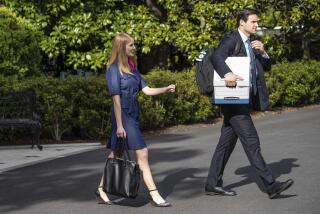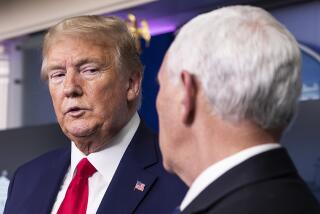Second NSC Official Contradicts Deaver
- Share via
WASHINGTON — A National Security Council official Monday contradicted sworn statements of former White House aide Michael K. Deaver by testifying that Deaver telephoned him at the NSC in late November, 1985, on a Puerto Rican tax issue that Deaver was lobbying for.
The statement by Steven I. Danzansky at Deaver’s perjury trial marked the second time that an NSC official has disputed Deaver’s grand jury testimony of last year. Deaver said then that “I don’t recall” contacting any government official on the tax question aside from Treasury Secretary James A. Baker III and his top assistants.
Earlier this month, former National Security Adviser Robert C. McFarlane testified that Deaver had called him on May 24, 1985, about the same matter. Deaver at the time was representing the Smith Barney investment firm, which had hired him for $200,000 to help preserve a U.S. income tax break for American companies holding investments in Puerto Rico.
Last Friday, Secretary of State George P. Shultz told Deaver’s federal court jury that President Reagan’s former close confidant had also visited him to discuss the Puerto Rican tax matter. Shultz said Deaver came to his office in October, 1985.
Two other witnesses Monday, Deputy Treasury Secretary Richard G. Darman and Washington tax attorney Richard Copaken, who was representing Puerto Rico, stressed that Deaver was engaged in feverish lobbying because the Reagan Administration was deeply divided over the issue. Deaver had resigned as deputy White House chief of staff on May 10, 1985.
The witnesses said Treasury Secretary Baker favored eliminating the tax break on grounds that it was costing the U.S. Treasury billions of dollars in income, but the State Department and the NSC favored retaining the tax incentive because it provided more jobs for Puerto Rico and could help stabilize the economy of the Caribbean region.
Eventually, Darman told the jury, Administration officials and members of Congress worked out a compromise whereby minor changes were made in the tax law that avoided any harm to Puerto Rico’s economy.
Danzansky, the NSC’s expert on the issue, testified that Deaver had telephoned his home on the morning of Nov. 16, 1985, when he was out running. He said that he returned the call but that Deaver’s wife, Carolyn, reported that her husband had just left town on a trip.
Late that afternoon, Danzansky said, Deaver reached him at the NSC from a telephone at the St. Louis airport “and I told him I thought a compromise had been worked out.” He said Deaver was relieved but expressed regret that the tax provision, known as Section 936 of the Internal Revenue Code, was being changed at all.
Under questioning by independent counsel Whitney North Seymour Jr., Danzansky said that he had not known Deaver personally while both were in government and had never before spoken with Deaver. He said he had been surprised that Deaver had obtained his unlisted home telephone number.
The perjury charge involving the tax issue is only one of five counts of lying under oath on which Deaver is standing trial. The others involve the scope of his contacts with executive branch officials in general and, specifically, his lobbying for such clients as Trans World Airlines and the governments of Canada and South Korea.
More to Read
Sign up for Essential California
The most important California stories and recommendations in your inbox every morning.
You may occasionally receive promotional content from the Los Angeles Times.













